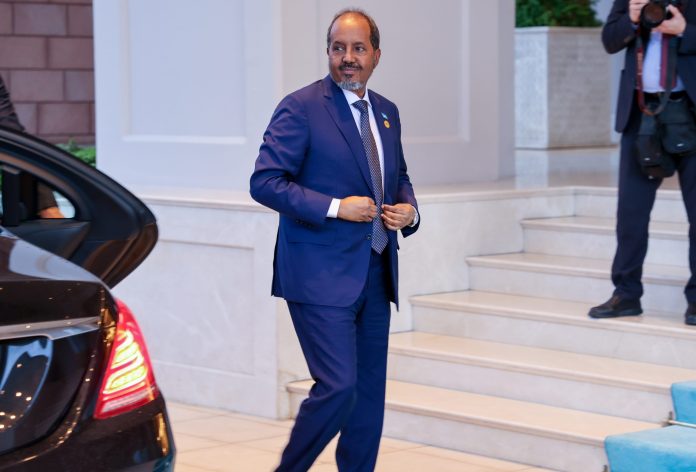Mogadishu, Somalia – Somali President Hassan Sheikh Mohamud is currently on his most extended foreign trip to date, a discreet diplomatic offensive that began on July 6 in Egypt and has since taken him to Turkey, with an unconfirmed but anticipated leg in Azerbaijan. The extended tour comes amid heightened regional tensions, particularly concerning Ethiopia’s Grand Ethiopian Renaissance Dam (GERD) and its ambitions for sea access.
President Mohamud’s initial delegation, which included the Minister of Defense and the Intelligence Chief, has reportedly returned to Somalia, leaving him to continue sensitive and, in some cases, undisclosed meetings alone. His last public appearance was on July 11 in Ankara, where he met with Turkish President Recep Tayyip Erdoğan.
Somalia finds itself at a critical juncture, facing significant pressure from its neighboring country, Ethiopia, while simultaneously seeking strategic defense partnerships with Egypt and Turkey. These alliances, however, are complex, as Cairo and Ankara possess divergent interests in the Horn of Africa.
Egypt’s primary concern revolves around the GERD, which Ethiopia is set to inaugurate in September. Cairo fears that the dam will significantly reduce its vital water supply from the Nile River. With a potential military confrontation over the dam looming, Egypt is reportedly seeking Somali consent for land and sea access to launch operations, a proposition Somalia appears to view as mutually beneficial.
Turkey, on the other hand, is keen to expand its economic footprint and access to resources across Africa, with Somalia serving as a crucial entry point. Bilateral defense agreements, offshore oil exploration, and lucrative economic partnerships underscore Turkey’s vested interest in Somalia’s stability and sovereignty.This has led Ankara to position itself as a key defender of Somalia’s interests.
Somalia’s quest for allies
Somalia faces an even more direct and existential threat from Ethiopia’s persistent quest for Red Sea access, including ambitions for seaports, maritime passages, and military bases on Somalia’s coast. This potential encroachment on its sovereignty is forcing Somalia to seek powerful allies actively, and both Egypt and Turkey have seemingly opened their doors to it.
President Mohamud’s current diplomatic efforts are reportedly focused on addressing this critical issue. Beyond Turkey, there are strong indications he may travel to Azerbaijan, a nation with advanced expertise in oil resource utilization. While an official announcement regarding a visit to Baku is still pending, sources suggest it is a highly anticipated next stop on his itinerary.
The current diplomatic maneuvers are set against a backdrop of complex regional dynamics. The Horn of Africa has historically been a hotbed of geopolitical competition, with various regional and international powers vying for influence. Ethiopia’s landlocked status since Eritrea’s independence in 1993 has fueled its persistent desire for direct sea access, often putting it at odds with its neighbors.
The GERD, a massive hydroelectric project on the Blue Nile, has been a contentious issue between Ethiopia, Egypt, and Sudan for over a decade. Egypt views the Nile as its lifeline and fears the dam will threaten its water security.
Turkey’s engagement in Somalia has grown significantly over the past decade, encompassing humanitarian aid, infrastructure development, and military training. This growing presence is often seen as part of Turkey’s broader “opening to Africa” policy.
Somalia, recovering from decades of civil conflict and battling the al-Shabaab insurgency, is leveraging its strategic geographic location and potential natural resources to attract foreign investment and secure defense partnerships. The outcome of President Mohamud’s extensive diplomatic tour will likely have significant implications for the delicate balance of power in the Horn of Africa.


